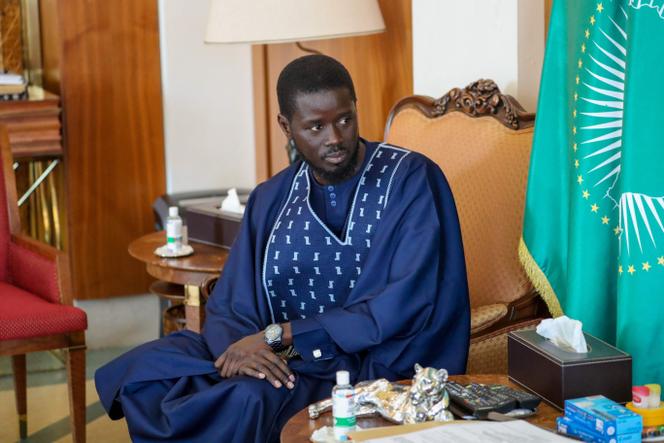


Bassirou Diomaye Faye was expected in both Mali and Burkina Faso on Thursday, May 30, for a "friendship and working visit," according to a press release from the Senegalese presidency, with a view to strengthening "historic ties of good neighborly relationship." Senegal's new president is due to meet Burkina Faso's leader, Captain Ibrahim Traoré, in Ouagadougou for the first time, and the president of Mali's transitional government, Colonel Assimi Goïta, in Bamako. Both men are coup leaders at odds with the Economic Community of West African States (ECOWAS), in which Senegal is a key player.
While these coup plotters maintain tense relations with some of their West African counterparts, they share the same pan-Africanist, sovereignist rhetoric with the Senegalese president. Faye was elected on a platform advocating a break with the neo-colonial order and a promise of change. At his inauguration on April 2, his supporters cheered the officials from Mali and Burkina Faso who had made the trip. This ideological proximity raised questions among Senegal's Western partners and within ECOWAS. Which side would Macky Sall's successor choose?
Neither, replied Faye. Buoyed by his exemplary election – he won in the first round, without any challenge from his opponents – he intended to use his popularity to serve West Africa. "I am convinced that we must continue to act in solidarity within the ECOWAS space, make the necessary reforms and work to dispel the misunderstandings that are bound to arise," he declared on May 7, in Abidjan, affirming that ECOWAS "is a formidable tool for integration [that] we will gain by preserving." This message was addressed directly to the three countries that have set up the Alliance of Sahel States (AES) jeopardizing the survival of the regional organization.
The future of ECOWAS and the CFA franc, a symbol of "Françafrique" (French post-colonialist sphere of influence) that putschists like Faye want to see disappear, as well as security issues in a region plagued by armed terrorist groups, should be at the heart of the discussions the Senegalese will have with his counterparts in Bamako and Ouagadougou.
Positioning himself as a regional leader should also enable him to fulfill other ambitions. A Ministry of Foreign Affairs official, who requested anonymity, said: "These trips to the region are also aimed at improving negotiations with European countries. On issues such as migration and economic agreements, it is in his interest to bring his views to the attention of his counterparts." Voters' expectations relate to those issues "which mix diplomacy, the economy and domestic questions," said Sambou Ansou, member of the national communications secretariat of PASTEF (African Patriots of Senegal for Work, Ethics and Fraternity), the party founded by President Faye and Prime Minister Ousmane Sonko.
During his campaign, the PASTEF candidate promised to renegotiate fishing agreements signed with the European Union, as well as gas and oil contracts with foreign operators. He discussed these issues with European Council President Charles Michels, who visited Dakar on April 23, calling for a " revised, renewed partnership." A Ministry of Foreign Affairs official, who requested anonymity, emphasized the symbolic significance of Rwandan leader Paul Kagame's visit to Dakar in mid-May. "Kagame embodies African sovereignty and a relaxed relationship with the West, and this speaks to Diomaye Faye and contributes to his popularity among young people."
Faye will next prepare for his trip to France, scheduled for June 20, when he is due to meet his French counterpart, Emmanuel Macron. "In the region and beyond, Diomaye Faye wants to make a break with the past, but also ensure continuity," concluded Mamadou Lamine Sarr, who teaches political science at Dakar's Cheikh Hamidou Kane University.
Translation of an original article published in French on lemonde.fr; the publisher may only be liable for the French version.
